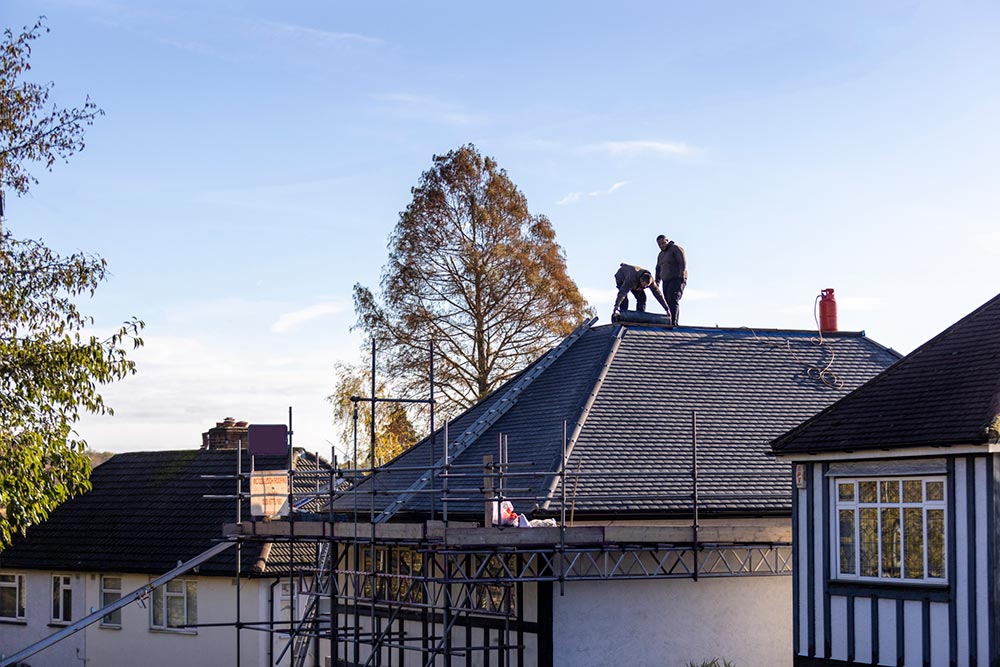
Eco-friendly roofing aims to minimise the environmental impact of buildings by using sustainable materials, reducing energy consumption, and promoting energy efficiency. Read on for everything you need to know about eco-friendly roofing, including insulation options, sustainable materials, green roofs, and the UK government’s advice and initiatives.
Insulation options
Spray foam
Spray foam insulation is a popular choice for its high insulating properties and ability to create an airtight seal. The product is sprayed from small cannisters into every crevice then sets rock hard. It can help reduce energy loss and improve thermal efficiency, plus it’s very easy to transport compared to more cumbersome options, further reducing its carbon footprint. However, it’s important to choose a low VOC (volatile organic compound) formulation to minimise environmental impact. Critically, you must appoint a registered and qualified installer as a poor job could make your property unsaleable in future. Since 2022, mortgage lenders have declined to lend against homes with foam insulation as surveyors are unable to inspect the roof timbers beneath it for damp or mould. There are currently believed to be around 250,000 homes across the UK that are now unmortgageable unless the foam is removed (which will cost more than it cost to install and may also damage the roof in the process). Do your homework.
Natural fibres
Materials like wool, hemp, and cellulose are sustainable insulation options. They offer good thermal performance and are renewable, recyclable, and biodegradable. Natural fibre insulation also has excellent sound absorption properties.
Recycled insulation
Made from recycled materials like denim, newspapers, or plastic bottles, recycled insulation provides the most eco-friendly alternative. It reduces waste and has similar insulating properties to traditional options.
Sustainable roofing options
Metal roofs
Metal roofs are durable, recyclable, and energy efficient. They reflect sunlight, reducing heat absorption, and can be made from recycled materials. Additionally, they have a long lifespan, reducing the need for replacement.
Solar roofs
Solar panels integrated into roofing systems generate clean electricity, reducing reliance on fossil fuels. Solar roofing options are becoming more aesthetically pleasing and efficient, allowing homeowners to produce renewable energy while maintaining an attractive roof.
Sustainable shingles
Some shingles are made from recycled materials, such as rubber or plastic, reducing the demand for new resources. They can mimic the appearance of traditional shingles while providing better durability and longevity.
Green roofs
Green roofs involve growing vegetation on the roof surface, providing numerous environmental benefits. They improve insulation, reduce stormwater runoff, absorb carbon dioxide, and create habitats for wildlife. Green roofs can also enhance the aesthetics of a building but do your planning carefully as the weight of the substrate and plants needs to be fully factored into your structural calculations.
Government advice and initiatives
The UK government provides various initiatives to promote energy-efficient and insulated roofs. These include:
-
Green Homes Grant
This initiative aimed to provide financial support to homeowners for energy-saving measures, including roof insulation. It closed for new applications in March 2021 but keep your eyes and ears peeled as new incentives are added.
-
Energy Performance Certificates (EPCs)
EPCs are mandatory for all buildings when constructed, sold, or rented. They provide information on a building’s energy efficiency and recommendations for improvements, including insulation.
-
The Energy Company Obligation (ECO)
ECO offers grants and assistance to low-income households to improve energy efficiency, including roof insulation.
When considering eco-friendly roofing options, it’s essential to consult with professionals, such as the team at McColloch Roofing, who can help to assess your specific needs and provide recommendations based on your location, budget, and sustainability goals, while ensuring compliance with local regulations and building codes. If you have any other concerns about any aspect of your roof, do please give us a call on 020 8776 1693.
